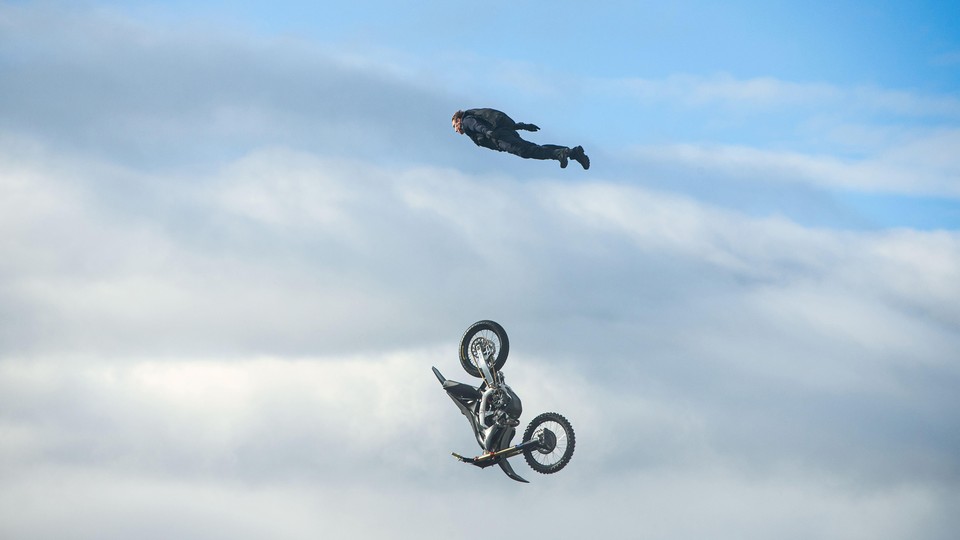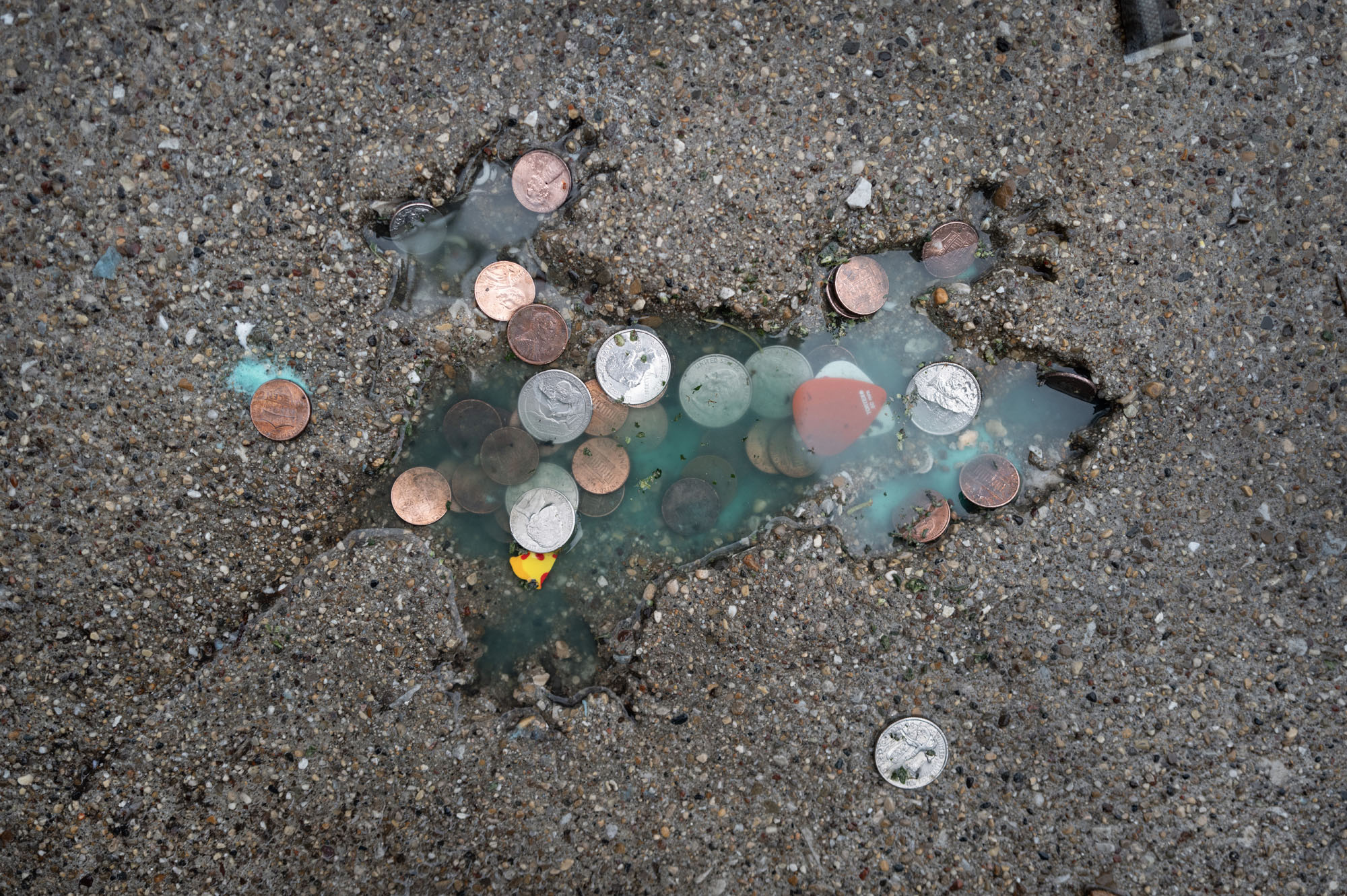Six Binge-Worthy Movie Series
7 min read
This is an edition of The Atlantic Daily, a newsletter that guides you through the biggest stories of the day, helps you discover new ideas, and recommends the best in culture. Sign up for it here.
Welcome back to The Daily’s Sunday culture edition.
Few things are better than staying in on a Sunday afternoon and putting on a good movie—or two, or three. The Atlantic’s writers and editors answer the question: What is your favorite movie series to binge?
The Mission: Impossible series (streaming on Paramount+)
Watching seven whole movies may sound like a difficult binge, but marathoning the Mission: Impossible films is, well, a mission I’ll always accept. They’re pure popcorn entertainment, and watching them is a far easier task than anything Tom Cruise’s superspy character has had to do. Across the almost 30-year-old franchise—with another entry coming next year—Ethan Hunt has prevented a pandemic and a nuclear war, taken down multiple arms dealers and terrorist-organization leaders, and, in what remains my favorite gag, donned a series of ridiculous (and impressively realistic) masks.
Part of the joy of watching the Mission: Impossible movies in one sitting is seeing what each director does with the material: Brad Bird, known for his animation work, brings a delightfully kinetic energy to Ghost Protocol, while the Hong Kong auteur John Woo prefers hypnotic slow-motion shots in Mission: Impossible II. Of course, the biggest draw remains Cruise’s dedication to performing his own stunts, whether it’s leaping out of an airplane or dangling off the side of a skyscraper. Ethan Hunt may work to save the world, but Tom Cruise works to dazzle us. And in these movies, he never fails.
— Shirley Li, staff writer
The Back to the Future trilogy (streaming on FuboTV)
I’m going to cheat on this question slightly, because my favorite movies are almost entirely one-offs, and I usually save my binge-watching for sports. But as movie series go, a somewhat underappreciated one is Back to the Future. The original is a family classic—I watched it the first time at the theater, as a teenager, with my Boomer parents, precisely the generational targets for the movie’s time-travel humor.
The sequels probe the twisted psyche of Biff Tannen, a misogynistic oligarch in one of the alternate futures and one of my personal favorite movie villains. (Tannen was inspired by Donald Trump, according to the screenwriter Bob Gale. The actor, Tom Wilson, also later played a much more complex and sympathetic version of a bully as the gym teacher on Freaks and Geeks.) Tying together the films is a series of front-page stories in the Hill ValleyTelegraph, a fictional paper with news judgment so strange that I once wrote a column analyzing it.
Although the sequels, like most sequels, pale against the original, they each explore the question “What would you do if you traveled back in time and possessed modern knowledge?” The answer is basically: invent things, gamble on sports, and try to score dates with Lea Thompson.
— Jonathan Chait, staff writer
The Lord of the Ringstrilogy (streaming on Max)
There’s no wrong time to watch the Lord of the Rings trilogy, but the winter holidays are the perfect time. These fantasy classics introduce you to the wonders of Middle-earth—replete with its own histories, languages, and mythologies—and J. R. R. Tolkien’s characters: Aragorn and his sharp pride, Frodo and his understated courage, Gimli and his uncouth charm. The books swept me away as a child, and Peter Jackson’s rendition more than does them justice.
That’s in part because the films run roughly three hours each (four if you watch the extended cuts, which I recommend). Jackson needed every minute to unfold a number of intertwining, tension-filled plots, battles, friendships, and romances. The movies’ lengths are something to luxuriate in, perfect for cozy December and January evenings—indeed, they each debuted in theaters on the third Wednesday of December. You could even tack on the more recent live-action Hobbit trilogy, but I’d actually opt for the much shorter 1977 animated version, which perfectly captures the novel’s appeal to children.
— Matteo Wong, staff writer
The High School Musical trilogy (streaming on Disney+)
In the first installment of the High School Musical series, our protagonists—Troy, a 5-foot-8 basketball star, and Gabriella, a girl who is both pretty and good at math—accidentally audition for the school musical and destabilize their high school’s social order. The Disney plotline is predictably unrealistic, but real problems poke their way in: The high-school arts department is struggling! Troy’s dad can be mean. Figuring out who you are is hard when your classmates sing in unison about where you belong.
The sequel is an ultra-saturated fever dream. A group of high schoolers get summer jobs at a country club. Troy sings an anxious rock anthem while running across an entire golf course. No notes.
Then, the finale: I saw High School Musical 3 in theaters (the first two were made-for-TV releases) when I was 8. Years later, I still appreciate how the film captures the bittersweet celebration of senior year and the stress of figuring out what happens after the curtain falls. If you decide to make this series your next movie binge, watch for the nostalgia and stay for the standout musical numbers (everyone, say thank you to the director Kenny Ortega, who also choreographed Michael Jackson’s stage tours).
— Hana Kiros, assistant editor
The Indiana Jones trilogy (streaming on Pluto TV and Prime Video)
I want to emphasize trilogy. The fourth Indiana Jones film suffers from too much Shia LaBeouf, and the fifth was an instantly forgettable CGI fest. But Raiders of the Lost Ark and its two sequels have retained their magic. Harrison Ford’s relentlessly physical performance deserves much of the credit. His Indiana Jones is a paragon of 20th-century American masculinity: He is a scholar, but not in an affected, European way. This is a man who can keep a lion at bay with a whip, outduel a tank on horseback, and land knockout punches on all manner of Nazis.
The movies are dated in their depictions of certain cultures—Temple of Doom, which follows Jones on an adventure in India,is marred by unseemly Orientalism—but they still offer viewers a powerful escapism. In just the first hour of Raiders, we’re whisked off to the Peruvian jungle, a snowy Himalayan saloon, and the sunbaked streets of Cairo. The ancient artifacts that Jones seeks add another layer of fantasy. They ask us to envision lost worlds, often through a mystical lens, and they do it all without slowing down the pace for a single second.
— Ross Andersen, staff writer
The Before trilogy (available to rent on YouTube)
My favorite movie series is also the only movie series I’ve seen: Richard Linklater’s Before trilogy. I’m not a huge fan of romance movies, but these three magical films stand apart from others with near-identical premises. I watched the first, Before Sunrise, during a boring weekend in my 20s, which turned out to be the perfect time to watch a movie about two adrift 20-somethings, played by Julie Delpy and Ethan Hawke, wandering around Vienna and falling in love.
I followed that up soon afterward with the second, Before Sunset, which features … the same exact actors, this time as 30-somethings, wandering around Paris and re-falling in love. For some reason, merely swapping the cities and ages works so well.
Not long after that, in 2013, Linklater released the final installment, Before Midnight, which I saw in theaters. This one had a harder edge—the two main characters, now a couple, wrestle with parenting, career woes, and other adult concerns. But it’s still impossible to take your eyes off them.
What is it that makes these five hours of two people talking so captivating? Is it Linklater’s gift for realistic dialogue, or is it that we all wish we had met our husband on a European train in 1994? It’s hard to say but very easy to watch.
— Olga Khazan, staff writer
Here are three Sunday reads from The Atlantic:
- America needs to radically rethink what it means to be old.
- The 13 best TV shows of 2024
- America’s most watched bishop
The Week Ahead
- Mufasa: The Lion King, a musical prequel and sequel to The Lion King that follows Mufasa, an orphan who is adopted by Prince Taka’s family (in theaters Friday)
- Laid, a dark-comedy series about a woman who realizes that her exes are mysteriously dying (premiering on Peacock on Thursday)
- Sonic the Hedgehog 3, an animated film about the emergence of a powerful villain, Shadow, voiced by Keanu Reeves (out Friday)
Essay

The Hawaiians Who Want Their Nation Back
By Adrienne LaFrance
At the edge of a forest on the island of O‘ahu, through two massive metal gates—if you can convince someone to let you in—you will find yourself inside the compound of the self-appointed president of the Nation of Hawai‘i.
Read the full article.
More in Culture
- Read these six books—just trust us.
- The 10 best movies of 2024
- “Dear James”: My friend outed me to her conservative parents.
- January cover story: “Walk on air against your better judgment.”
- Nikki Giovanni’s wondrous celebrations of Black life
Catch Up on The Atlantic
- Decivilization may already be under way.
- Trump is about to betray his rural supporters.
- Anne Applebaum: The Syrian regime collapsed gradually—and then suddenly.
Photo Album

As the end of the year approaches, take a look back at some of the major news moments from the first months of 2024.
Explore all of our newsletters.
When you buy a book using a link in this newsletter, we receive a commission. Thank you for supporting The Atlantic.



